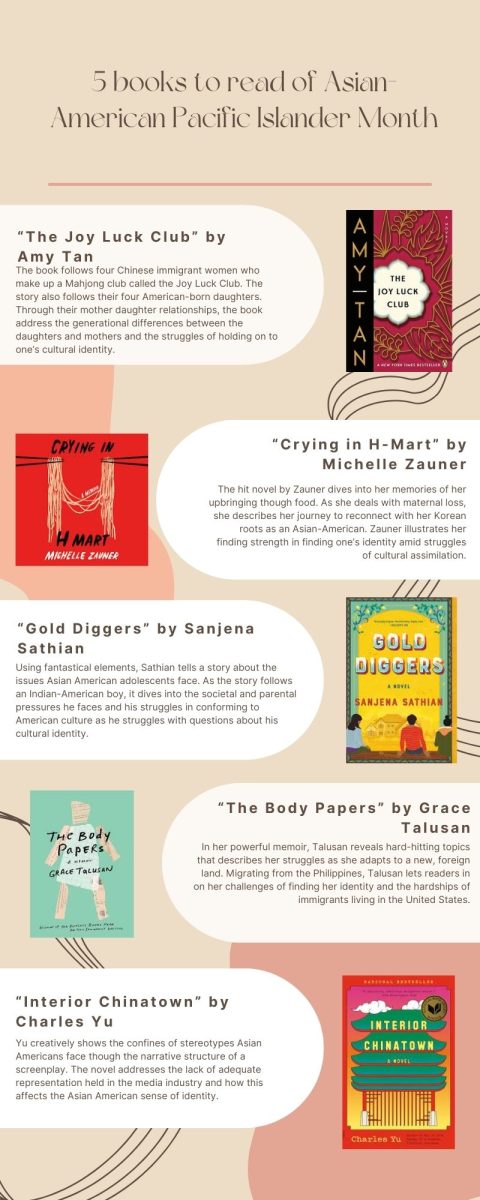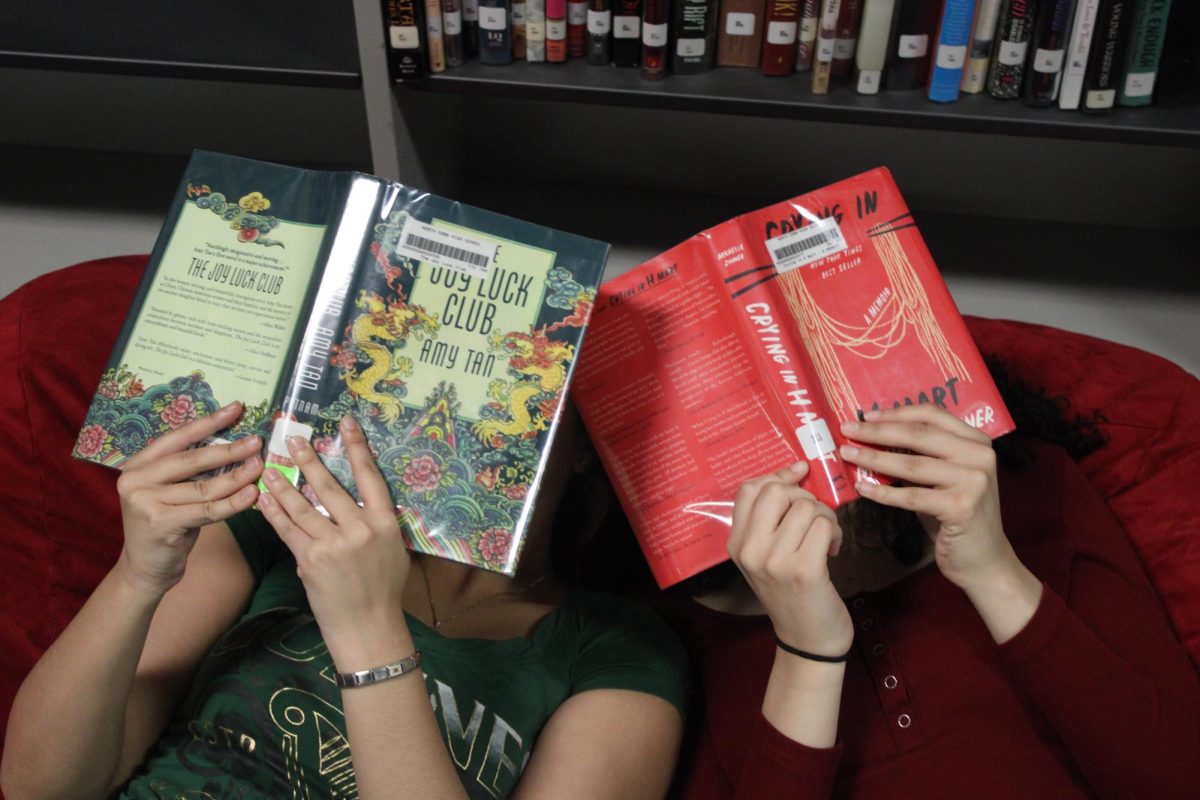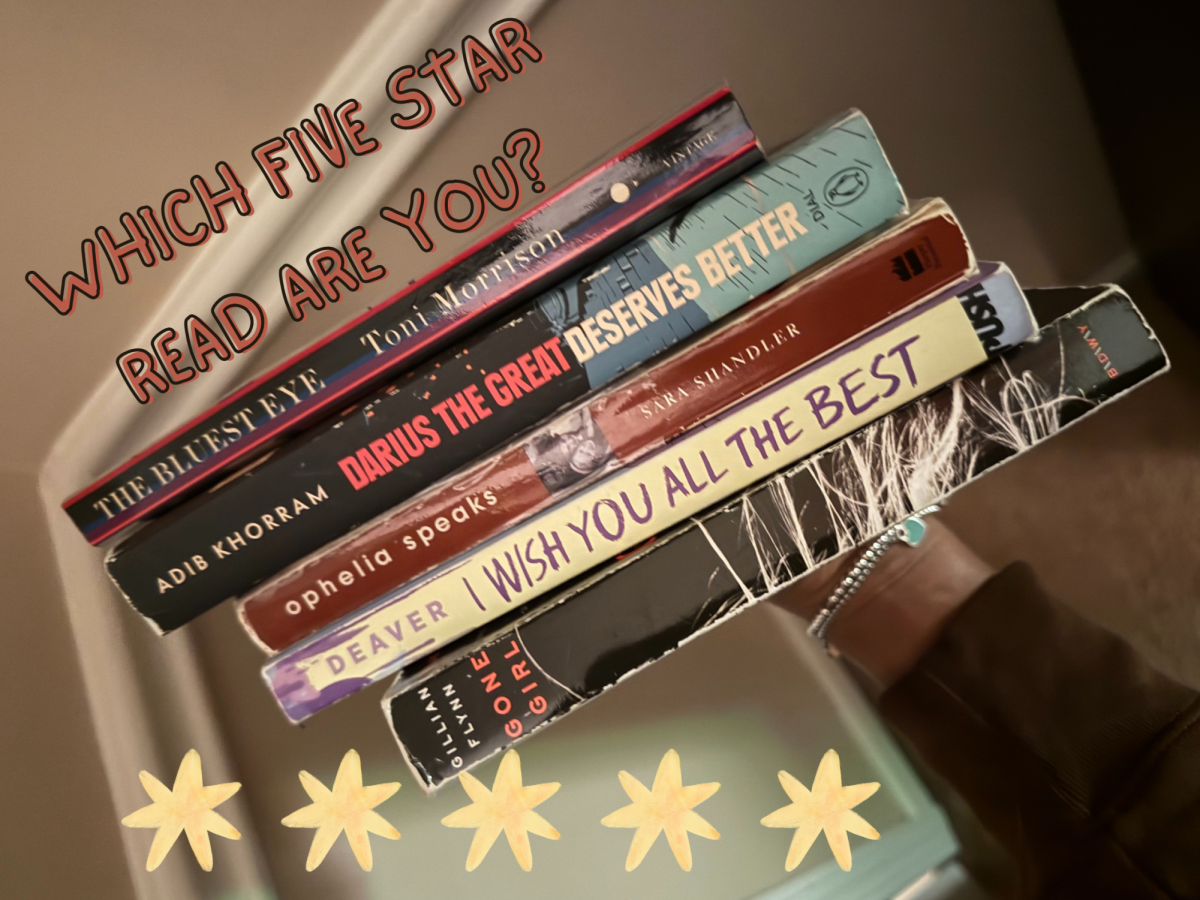May marks the month to celebrate the heritage of Asian Americans and Pacific Islanders (AAPI). Asians hold a rich culture that has taken form in media and literature. To recognize AAPI culture and its stories, pick up these five pieces of literature to acknowledge and recognize the diverse narratives of their strides.
Amy Tan’s highly praised novel, “The Joy Luck Club ” follows four Chinese immigrant women, who form a club with the book’s name. The club forms around the presence of them playing games of mahjong while enjoying their cultural dishes, and taking part in their usual gossip about their children. The book also revolves around the lives of their four American-born daughters. Comprising 16 short stories from each woman, Tan creatively sets the narrative structure to a mahjong metaphor by dividing the book into four parts to create 16 chapters.
The stories dive into the complicated and complex relationships between Chinese immigrant mothers and their American daughters. As the mothers struggle to preserve their Chinese culture and cling to their values, their daughters battle with the pressures of American identity and welcome Western societal ideals, highlighting generational and ideological tension. The book also illuminates the struggles of immigrants, illustrating the challenging experiences and hardships immigrants face starting a new life in a new country.
Michelle Zauner’s memoir has become a recognizable name in the book community, with it receiving critical acclaim and debuting as the seventh best-selling hardcover nonfiction book a week after its publishing. Zauner first released an essay with the same name in the publication The New Yorker and later wrote the book as an expansion after literary agents reached out following the release of her essay. Two months after the publishing of her autobiographical novel, Orion Pictures announced the production company would turn the book into a feature film.
The book starts off with the essay published in the New Yorker and follows her as she navigates through the aisles of H-Mart— a North American supermarket chain store that focuses on Asian products. As Zauner delves into the events of her upbringing, she writes about the cultural struggles of her Korean-American identity. The main focus relates to the complex relationship between her and her mother and her mother’s terminal cancer, leading to her eventual passing. Zauner intertwines her Korean roots with her mother, but as she stays by her side during her fight with cancer, she reconnects her to her Korean identity through food and memories. Zanuer’s profound narrative allows for insight related to the feelings of losing family members and finding strength in one’s cultural identity. She also addresses the struggles of a mixed-race individual and the pressure of assimilation in society.
In 2021, Sanjena Sathian released her debut novel, “Gold Diggers”, incorporating the magical realism genre while also following an Asian-American narrative. Sathian fuses fantastical elements to open up a lens to the experiences of young AAPIs through a complex cultural world. The same year of its debut, actress and producer Mindy Kaling announced that her production company Kaling International would turn the book into a television series.
The book introduces readers to the main character Neil Narayan, an Indian American boy who discovers a magical potion stolen from his neighbor’s home. The potion provides him with enhanced abilities, leading to academic success and social acclaim. While Neil already deals with the pressures of his parents for academic perfection and with his crush Anita, they both decide to drink the potion to maintain their scholarly excellence. Neil gradually becomes obsessed and relies on the potion’s powers while losing his grasp on his identity and the repercussions of his actions. Anita looks to stay away from the hold of her parent’s expectations and begin her own success story. As the two intertwine and their lives continue, they both encounter confusion about their identities and their sense of belonging. The story also follows them navigating through societal pressures and their strained relationship with their cultural heritage. Sathian blends imaginary elements to address serious topics about identity in the Asian American community, particularly resonating with adolescent AAPIs.
“I think it’s cool to see people that look like you, especially in fantasy books because I feel like those tend to focus on the same stereotypical white protagonist. You don’t tend to see people of color in fantasy books, especially as the main character and using the fantasy elements to address important topics that relate to Asian Americans,” magnet senior Samara Weatherly said.
Grace Talusan’s “The Body Papers”, explores her upbringing in the Philippines and her family’s journey to the United States through essays. Readers follow her and recount her obstacles as she traverses through a foreign land. Through the struggles of forming an identity and raw storytelling, she reveals the hardships of the undocumented life.
Talusan’s vulnerability reveals the sexual abuse she endured from her grandfather. She also tells about the discovery of her predisposed cancer diagnosis, ultimately leading her to remove her breasts and ovaries. Using vivid imagery and allusions, Talusan lets readers in on her powerful stories that address hard themes with authenticities, such as her undocumented status, her sexual abuse and her cancer journey.
In 2020, Charles Yu published his second novel: “Interior Chinatown”. The novel received a positive reception, acquiring the 2020 National Book Award and becoming longlisted for the 2021 Andrew Carnegie Medal for Excellence in Fiction. The same year of its release, streaming platform Hulu announced the production of a TV show adaptation.
Yu stylistically formats the book like a screenplay, complete with stage directions and dialogue tags, showcasing the performative nature of identity. The story takes place in a fictionalized version of Chinatown. The characters in the town only exist in the stereotypical roles of Hollywood production. The main protagonist, Willis Wu, struggles to break free from the confined roles given to him as an Asian American man. As he continually grapples with the challenges of the pressure of stereotypical identities, he internally dives into questions about his own individuality and belonging. Overall, the novel probes into the ideas of finding identity away from the roles society gives individuals and displays the importance of representation.
These books offer a commemoration to AAPI month with the ability to showcase the diverse stories within communities. These novels address the hard-hitting and prevalent topics that AAPIs face and dive into narratives that readers can relate to their own experiences. As APPI month arrives during May showers, reading these literary pieces can provide an understanding of the rich culture and wide-ranging perspectives of the AAPI community.

“Up until now, like with the 2020 Stop Asian Hate movement, the AAPI representation has gotten bigger and more inclusionary. In literature, I found more books in the school library that were written by Asian authors and I felt like I could relate to their stories a little more because I am Asian and I understand those books more. I feel proud that maybe it’s not my stories that are being represented but its a step forward into more AAPI inclusivity in all aspects of literature and media,” magnet senior Isabella Sutjiawan said.











